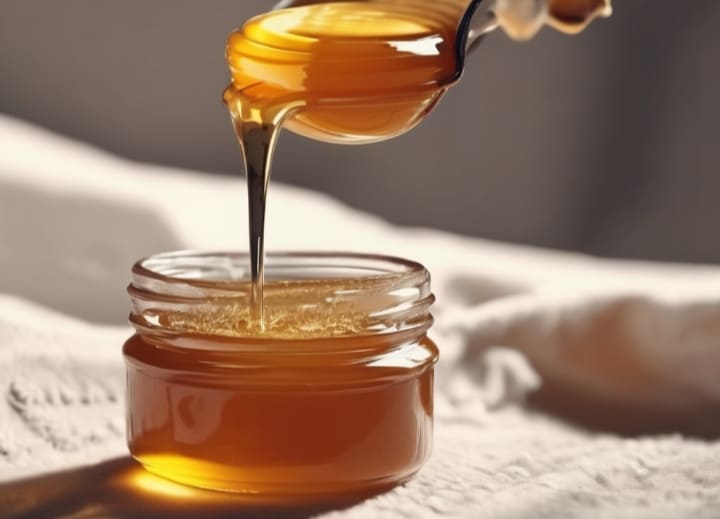
Honey is a natural sweetener enjoyed by people of all ages. But beyond its delicious taste, honey offers a surprising range of potential health benefits that can be particularly useful for growing children.
This article explores 7 science-backed health benefits of incorporating honey into your child’s diet, along with tips to optimize each of the benefits honey offers kids.
Health Benefits of Honey for Kids
Honey offers various health benefits for children, making it a valuable addition to their diet. Here are some key advantages of incorporating honey into a child’s diet supported by research:
1. Natural Cough Suppressant
Honey has a long history of use as a natural remedy for coughs. Its demulcent properties coat the throat, soothing irritation and reducing cough frequency and severity.
A study published in the journal “Pediatrics” compared the effectiveness of honey to dextromethorphan, a common cough suppressant ingredient, in treating children’s nighttime coughs. The study found that honey was as effective as dextromethorphan in reducing cough symptoms.
Optimization Tip: For a sore throat, consider a warm cup of chamomile or ginger tea sweetened with honey. The warmth of the tea can further soothe a scratchy throat, while the honey provides cough-suppressing benefits.
Important Note: Honey is not recommended for children under 1 year old due to the risk of botulism spores.
Don’t Miss:
- Benefits of Honey Over Sugar
- Health Benefits Of Yemeni Honey
- Health Benefits of Honey Chai Turmeric Tea
- Benefits of Honey While Sick
- Benefits Of Honey and Himalayan Salt
- The Benefits of Honey for Women’s Weight Loss
- Benefits of Taking Honey Before Running
- Benefits of Honey During a Cold and How to Maximize Their Effectiveness
2. Potential Immune System Support
Honey contains a variety of compounds, including phytonutrients and antioxidants, that may contribute to a healthy immune system. These compounds can help the body fight off infection and illness.
A study published in the journal “Immunology Letters” investigated the effects of honey consumption on immune function in healthy adults. The researchers observed increased activity of certain immune cells after honey consumption. While more research is needed to confirm these effects in children, the findings suggest a potential benefit for immune health.
Optimization Tip: Pair your child’s honey-sweetened tea with a citrus fruit, like orange or grapefruit, rich in vitamin C, another essential nutrient for a healthy immune system.
3. Potential Digestive Aid
Honey may promote digestive health due to its prebiotic properties. Prebiotics are a type of fiber that nourishes beneficial gut bacteria. These bacteria play a crucial role in digestion, nutrient absorption, and immune function.
A study published in the journal “Beneficial Microbes” investigated the effects of honey consumption on gut microbiota. The researchers observed an increase in beneficial gut bacteria in individuals who consumed honey regularly.
Optimization Tip: To maximize the potential prebiotic benefits of honey, consider including yogurt or kefir with your child’s honey-sweetened snack. These foods are rich in probiotics, which work synergistically with prebiotics to promote a healthy gut microbiome.
4. Natural Energy Source
Honey provides carbohydrates in the form of simple sugars, fructose and glucose. These sugars are readily absorbed by the body, offering a quick source of energy to fuel your child’s activities.
Optimization Tip: Combine honey with a complex carbohydrate source, like whole-wheat toast or crackers, for sustained energy. Complex carbohydrates take longer to digest, providing a steadier release of energy over time.
Important Note: While honey can be a good source of energy, it’s crucial to remember moderation is key. Consuming excessive amounts of sugar can lead to energy crashes and other health problems.

5. Soothing Wound Healing Properties
Honey has been used topically for wound healing for centuries, valued for its antibacterial and anti-inflammatory properties that may aid the healing process.
A review published in the journal “Wounds” evaluated the effectiveness of honey for wound healing and concluded that it may promote healing and reduce the risk of infection.
Optimization Tip: While honey cannot replace proper medical care for wounds, a honey-sweetened drink can be a helpful addition to your child’s routine when recovering from a minor scrape or wound. Look for Manuka honey, a specific type of honey with potent antibacterial properties, which may offer additional benefits.
Important Note: Consult your pediatrician before using honey for wound healing, especially for deeper wounds or those showing signs of infection, as professional medical care is crucial in such cases.
6. Potential Aid for Occasional Sleep Problems
Honey may offer some relief for occasional sleep problems in children. Studies suggest that honey can improve sleep quality by promoting the production of melatonin, a hormone that regulates sleep-wake cycles.
A study published in the journal “Asian Pacific Journal of Tropical Medicine” investigated the effects of honey on sleep in children with upper respiratory tract infections. The study found that honey improved sleep quality compared to a placebo.
Optimization Tip: For a relaxing bedtime drink, consider a warm cup of milk sweetened with a teaspoon of honey. Milk also contains tryptophan, an amino acid that converts to melatonin, further promoting sleepiness. This warm drink can create a calming bedtime ritual, while the honey and milk may work synergistically to promote better sleep.
Important Note: Honey should never be given to children under 1 year old due to the risk of botulism spores.
7. Source of Essential Nutrients and Potential Antioxidant Benefits
Honey contains a small amount of various vitamins and minerals, including B vitamins, vitamin C, potassium, calcium, and magnesium. While not a significant source of any one nutrient, these can contribute to your child’s overall dietary intake.
In addition to these vitamins and minerals, honey also contains antioxidants. Antioxidants are compounds that help protect cells from damage caused by free radicals, unstable molecules that can contribute to various health problems.
Optimization Tip: Honey can be a healthy addition to a balanced diet rich in fruits, vegetables, whole grains, and lean protein. These foods provide a wider range of essential vitamins, minerals, and antioxidants for optimal growth and development.
Consider adding a spoonful of honey to a bowl of yogurt with berries for a snack packed with vitamins, minerals, antioxidants, and healthy bacteria to support your child’s gut health.
Types of Honey Beneficial for Kids
When considering the types of honey that are good for kids, it’s essential to focus on raw and natural varieties that offer health benefits. Here are some types of honey suitable for children:
- Manuka Honey: Known for its unique antibacterial properties, Manuka honey is a popular choice for kids due to its potential health benefits, especially in aiding cough relief and supporting overall well-being.
- Wildflower Honey: Ideal for baking and sweet treats, wildflower honey provides a pure, sweet flavor loved by kids without the strong taste of Manuka nectar.
- Organic Honey: Extracted from nectar, organic honey is a natural gift rich in essential nutrients that can enhance a child’s health in various ways.
- Raw Honey: Raw honey, in its pure form, retains all its natural vitamins and minerals, making it a nutritious choice for children’s diets.
While these types of honey can offer health benefits to children, it’s important to note that honey should not be given to infants under one year old due to the risk of botulism. For toddlers and older children, incorporating these varieties of honey in moderation can provide both flavor and potential health advantages.
How Much Honey is Safe for Kids and How to Sweeten Their Day

Honey can be a delightful addition to a child’s diet, offering a touch of sweetness and potential health benefits. However, moderation is key, and knowing how much is safe is crucial.
Safe Amount of Honey for Kids:
- Age is the biggest factor: Honey is not recommended for children under 1 year old due to the risk of botulism spores.
- For children over 1 year old: The American Academy of Pediatrics (AAP) advises against large amounts of added sugar in a child’s diet [1]. A general recommendation is to limit honey intake to 1-2 teaspoons per day.
- Always consider your child’s overall sugar intake: If your child consumes sugary drinks or snacks throughout the day, adjust the amount of honey accordingly.
Creative Ways to Add Honey to Your Child’s Diet:
- Sweeten Beverages: A drizzle of honey can add sweetness to a cup of warm milk, calming chamomile tea, or a refreshing glass of lemonade (for older children).
- Dress Up Fruits: Drizzle a touch of honey over yogurt with berries or sliced apples for a naturally sweet and nutritious snack.
- Spreads and Toppings: Mix a little honey with nut butter for a healthier alternative to sugary spreads on toast or crackers.
- Baked Goods: Honey can be a partial substitute for sugar in some baking recipes. However, remember to adjust the recipe to account for the different sweetness and moisture content of honey.
Important Tips:
- Focus on a Balanced Diet: Honey should complement a healthy diet rich in fruits, vegetables, whole grains, and lean protein. These foods provide essential vitamins, minerals, and fiber for optimal growth and development.
- Prioritize Whole Foods: While honey offers some nutrients, it shouldn’t replace whole food sources of vitamins and minerals.
- Consult Your Pediatrician: If you have any concerns about introducing honey to your child’s diet, especially if they have any underlying health conditions, consult your pediatrician for personalized advice.
By incorporating honey strategically and prioritizing a balanced diet, you can help your child enjoy the potential benefits of this natural sweetener without compromising their health.
Also Checkout:
- Benefits of Honey for Diabetics Everyone Should Know
- Benefits of Honey for Stomach (Gut Health) and How to Maximize Their Effectiveness
- Benefits of Honey to the Brain
- Health Benefits of Adding Honey to Tea
- Benefits of Honey Lavender Tea
- Benefits of Honey Mustard and Recipe
- Honey Sticks: Benefits, Types, Recipe and Uses
- Health Benefits of Honey Wheat Bread And Recipes
- Honeybush Tea: Benefits and Preparation
- Benefits of Honey Bath You Should Know About
- Benefits of Eating Honey During Pregnancy
Conclusion
Honey can be a safe and natural addition to your child’s diet, offering potential health benefits and a touch of sweetness. Remember, moderation is key.
Always consult your pediatrician before introducing honey to your child’s diet, especially if they have any underlying health conditions.
By incorporating honey strategically and prioritizing a balanced diet, you can help your child reap the potential rewards that this natural ingredient has to offer.
References:
[1] https://sunshinehouse.com/blog/5-honey-health-benefits-for-children-over-2/
[2] https://www.ncbi.nlm.nih.gov/pmc/articles/PMC3601686/
[3] https://goodparentingbrighterchildren.com/benefits-of-honey/
[4] https://www.mayoclinic.org/drugs-supplements-honey/art-20363819
[5] https://www.ncbi.nlm.nih.gov/pmc/articles/PMC4264806/







































